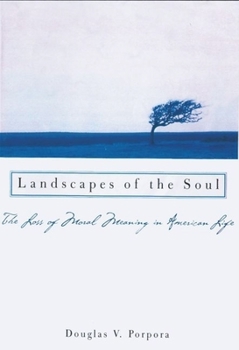Landscapes of the Soul: The Loss of Moral Meaning in American Life
Select Format
Select Condition 
Book Overview
Do you believe in God? Nine out of ten Americans unhesitatingly answer yes. But for Douglas Porpora, the real questions begin where pollsters leave off. What, he asks, does religious belief actually mean in our lives? Does it shape our identities and our actions? Or, despite our professions of faith, are we morally adrift?
Landscapes of the Soul paints a disturbing picture of American spiritual life. In his search for answers to his questions,...
Format:Hardcover
Language:English
ISBN:0195134915
ISBN13:9780195134919
Release Date:June 2001
Publisher:Oxford University Press, USA
Length:368 Pages
Weight:1.50 lbs.
Dimensions:1.4" x 6.1" x 9.0"
Customer Reviews
1 rating
Dazzling analysis of American malaise
Published by Thriftbooks.com User , 22 years ago
Doug Porpora aims to explain a paradox: how can the American public's beliefs about God have so little influence on their lives? It is an interesting issue, one which has ramifications far beyond contemporary America: Barbara Tuchman's study of fourteen century France, for instance, raises similar issues of contradictions between the beliefs people espouse and their conduct. Tuchman notes that "empathy is . . . the final obstacle" to understanding the Middle Ages. She sees religious belief as the key difficulty here.Empathy is one of Porpora's greatest strengths and some of the most remarkable parts of this book occur when he enters into dialogue with people who hold beliefs which many would dismiss as bizarre. Porpora is able to illuminate the beliefs of others, to make them intelligible. He elucidates the importance of tarot cards for one person, or another's belief that he has heard the voice of God. What Porpora brings out is the importance (or lack of importance) of these beliefs in people's lives, how they function to modify behaviour or why they have no effect on behaviour.The book is aimed at the general reader and is extremely engaging at this level; Porpora takes advantage of endnotes to point academic readers on to other sources. Porpora sketches in an argument that the postmodern experience of the self is true phenomenologically but not ontologically, an argument which he pursues in detail in some of his academic articles.One of the many aspects which Porpora explores is how a sense of larger purpose (in some cases provided by passionate religious belief, in others by a quest for social justice) influences people's experience of themselves. This book is more than a sociological analysis, it is a call to action. Some book reviewers have assumed that Porpora's call is essentially Christian, but it is far broader and deeper than that. It is essentially a call to heal a broken world. Porpora's promise to his readers is that commitment to larger purposes, to the creation of a world in which social injustice no longer dominates, will enrich their lives. Selfishness, Porpora believes, is doubly impoverishing: dealing out injustice to the poor and a sense of purposeless to the comfortable.





